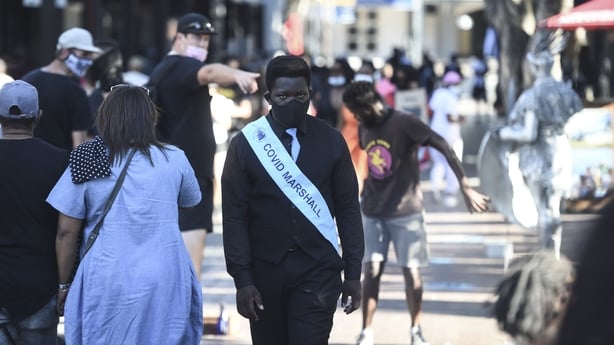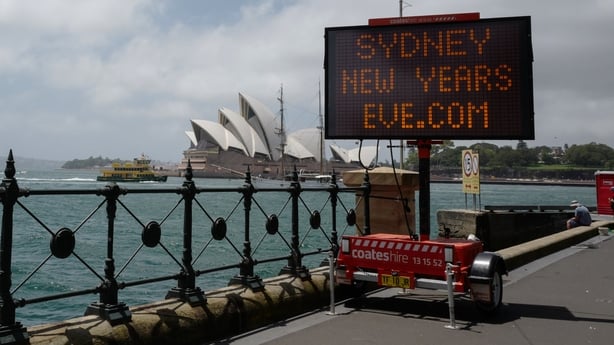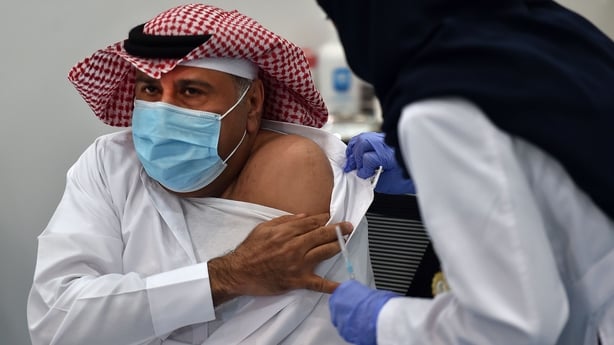Sweden's government today put forward a temporary pandemic law giving it new powers to curb the spread of Covid-19, which it said it hoped to have in place by January.
The government, which has controversially relied on mostly non-coercive measures during the pandemic, said the new law would enable it to close down businesses, shopping malls or public transport.
It would also be able to impose limits on the number of people allowed in specific public places, rather than general restrictions on public gatherings.
"Those who violate restrictions that limit access to public places can be sentenced to a monetary fine," Health Minister Lena Hallengren told a press conference.
The Swedish government said it wanted to have the law in place by 10 January, but it will first need to be approved by parliament.
Sweden has made headlines around the world for its decision to combat the spread of the virus with mostly non-coercive measures and never imposing the type of lockdown seen elsewhere around Europe.
Health authorities have insisted that battling the pandemic is "a marathon, not a sprint", and measures have to be sustainable for the long haul.
But unlike many other countries, Sweden also does not have legislation that allows the government to shut down society in peacetime.
However, faced with a strong second wave, the country has tightened preventative measures in recent months.
As cases multiplied, authorities urged people to limit social interactions to immediate family or a few friends.
A ban on public gatherings of more than eight people took effect last month, and last week the country for the first time recommended the use of face masks on public transport.
Despite moving forward on the new law and the tighter measures, Prime Minister Stefan Lofven told broadcaster SVT just before Christmas that the strategy had not changed.
The country of some 10.3 million had reported a total of 396,048 cases of Covid-19 and 8,279 associated deaths, when the latest figures were released on 23 December.
Meanwhile the distribution of an initial 200 million doses of the Covid-19 vaccine developed by Pfizer and BioNTech will be completed for the European Union by next September, a spokesman for the EU Commission said today.
"Distribution of the full 200 million doses is scheduled to be completed by September 2021," the spokesman told Reuters in an emailed statement.
He added that talks were under way to agree the delivery of a further 100 million additional doses which are optional under the contract sealed with the two companies.
Also today, South Africa tightened Covid-19 restrictions, banning alcohol sales and extending a nationwide curfew, as infections shot through the one million mark owing to a faster-spreading variant of the disease discovered in the country.

President Cyril Ramaphosa said in a televised address that cabinet had decided to move the country to level 3 restrictions from level 1.
This would include the total banning of alcohol sales, widespread cancelling of events, and making the wearing of masks in public a legal requirement.
"We now have to flatten the curve to protect the capacity of our healthcare system to enable it to respond effectively to this new wave of infections," Mr Ramaphosa said.
Global infections have raced past 80 million with nearly 1.8 million deaths, even as vaccination drives gather pace in North America and Europe, with a top US expert warning that the pandemic might get even worse in the coming weeks.
The explosion of cases worldwide in recent weeks has prompted the return of many unpopular restrictions, including some lockdowns, and concerns have grown after the detection of a new virus variant experts believe could be more transmissible.
South Africa became the first African nation to log one million cases, official data showed yesterday, as authorities considered reimposing restrictions to battle a second wave of infections driven by the new variant.
Most European countries began their vaccination campaigns over the weekend, boosting hopes of an end to the pandemic, especially in some of the hardest-hit parts of the continent.
Known coronavirus infections surged past 19 million in the United States, the worst-hit country in the world, adding a million cases in less than a week.
But there was some relief for Americans when President Donald Trump finally signed a $900bn stimulus bill, a long-awaited boost for millions of people whose livelihoods have been battered by the pandemic.
Sydney bans New Year crowds as Australian virus cluster grows
Plans to let thousands of frontline workers ring in the new year around Sydney Harbour were ditched today as authorities work to suppress a growing cluster of virus cases in Australia's most populous city.
Ordinarily, hundreds of thousands of eager partiers flock to vantage points for the midnight fireworks launched from the Sydney Harbour Bridge.

Although allowing the usual hordes of revellers had been ruled out this year, officials had plans to welcome around 5,000 workers to the foreshore as a token of thanks for their work against the pandemic.
But that idea has now been axed over fears the celebrations could turn into a super-spreader event.
"We've abandoned our plans in terms of any foreshore viewing of the fireworks from the Sydney CBD, so that won't be allowed," the state leader of New South Wales, of which Sydney is the capital, Gladys Berejiklian, said.
Permits will also be required to enter some parts of the city as celebrations will be limited to controlled, socially-distanced events and small gatherings at people's homes.
"We do recommend very strongly that people watch the fireworks on TV or go to a local venue outdoors which is not on the foreshore and doesn't have that cramped crowding," Ms Berejiklian said.
The decision to tighten restrictions comes as a cluster of cases on the city's northern beaches grew to 126 and a lockdown for several suburbs was extended until 9 January.
Before the cluster, which emerged earlier this month, life had been returning to relative normality around the country as the number of daily virus cases slowed to a trickle.
Australia has recorded over 28,300 cases and 909 deaths linked to the virus in a population of about 25 million.
Saudi suspends passenger flights by at least one week
Saudi Arabia has extended its suspension of commercial passenger flights by at least one week and possibly two amid concerns over a new variant of the coronavirus.
Saudi Arabia will however allow flights in "exceptional cases", an interior ministry official said according to the official Saudi Press Agency (SPA) on Sunday.
Foreigners will be allowed to depart the kingdom and cargo movement will be permitted, it added.

Saudi Arabia, Kuwait and Oman suspended passenger flights and banned entry and exit via their land and sea borders last week after a new strain of the novel coronavirus appeared in Britain.
Oman and Kuwait said they plan to lift the ban on 29 December and 1 January, respectively.
"Saudi Arabia decided to extend the aforementioned measures for another week to continue assessing the situation and to ensure safety of citizens and expatriates," said the SPA report.
Earlier this month, the kingdom kicked off a Covid-19 vaccination campaign, using the Pfizer-BioNTech jab.
Saudi Arabia has so far recorded more than 362,000 cases, including more than 6,000 deaths - the highest among the Gulf Arab states - but has also reported a high recovery rate.
Pfizer delays vaccine deliveries to eight EU nations
Pfizer has postponed the delivery of new batches of its coronavirus vaccine to eight European nations including Spain, the Spanish health ministry said today, a day after the EU began its immunisation campaign.
The Spanish branch of Pfizer informed Madrid last night of the delay in shipments to the eight nations due to a "problem in the loading and shipment process" at its plant in Belgium, the health ministry said in a statement.
It did not specify which European nations aside from Spain were affected.
Pfizer has informed the ministry that the problem "was already resolved" but the next delivery of vaccines "will be a few hours late" and arrive in Spain tomorrow, a day later than expected, the statement said.
Asked about the delay during an interview with radio Ser, Health Minister Salvador Illa said it was due to a problem "linked to the control of the temperature" of the shipments which was "apparently fixed".
The vaccine must be stored at ultra-low temperatures of about -70 degrees Celsius before being shipped to distribution centres in specially designed cool boxes filled with dry ice.
Once out of ultra-low temperature storage, the vaccine must be kept at 2C to 8C to remain effective for up to five days.
Spain is scheduled to received 350,000 doses of the Pfizer-BioNTech coronavirus vaccine per week over the next three months.

